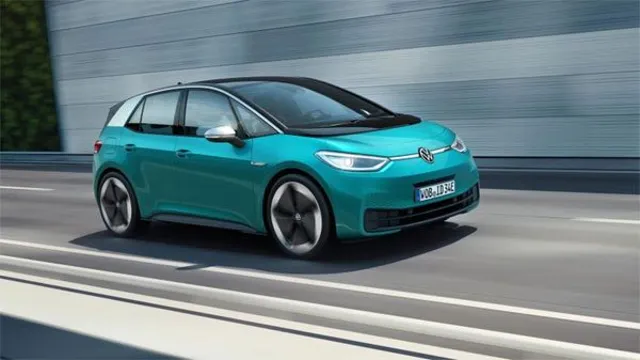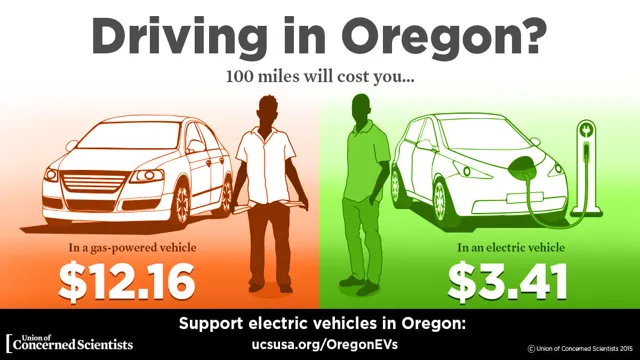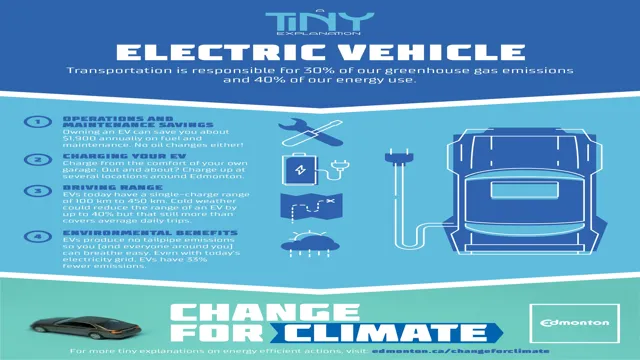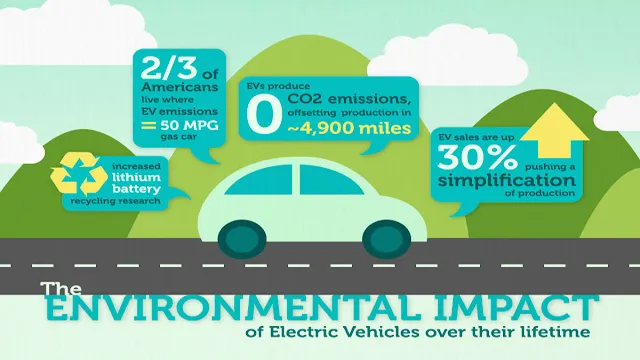Switching to Electric Cars: Analyzing Costs and Benefits to Save the Environment and Your Wallet
Electric cars have been a buzzing topic in the past few years, with many wondering if they are worth the investment. Traditional gasoline-powered cars have been around for over a century and are ingrained in our culture, but with the rising concern about the environment and the future of our planet, the electric car is becoming more and more popular. In this blog post, we will explore the costs and benefits associated with owning an electric car.
Have you been considering joining the electric car revolution? If so, read on to learn more about how they work, their benefits, and what costs you can expect to incur.
Overview
Electric cars have been rapidly growing in popularity due to the numerous benefits they offer. One of the major advantages of electric cars is their reduced environmental impact compared to traditional gasoline-powered vehicles. They produce zero emissions, which drastically reduces their carbon footprint and helps combat climate change.
Additionally, electric cars are generally cheaper to maintain and operate, as they require less frequent tune-ups and don’t rely on expensive gasoline. While the initial cost of an electric vehicle may be higher than a traditional car, the long-term savings on fuel and maintenance costs can result in significant cost savings over time. Electric cars are also known for their smooth and quiet ride, making them a popular choice for those seeking a comfortable driving experience.
Overall, while there may be some initial costs to consider, the benefits of electric cars make them a worthy investment for those looking to reduce both their carbon footprint and their expenses.
Current cost of electric cars compared to gas cars
Electric cars have been rising in popularity as people become more environmentally conscious and as technology improves. But one of the major concerns that people have with electric cars is their cost compared to gas cars. Currently, the cost of electric cars is higher than that of gas cars, but this gap is slowly closing.
While gas cars may have a lower sticker price, they come with higher running costs, as gas prices are constantly fluctuating. On the other hand, electric cars have a higher initial cost but offer much lower running costs, as electricity is generally cheaper than gas. Additionally, electric cars have tax incentives and rebates that can help offset the initial cost.
As more automakers enter the electric car market and the demand for them increases, the price will continue to decrease, making them a more viable and affordable option for all.

Electric cars are cheaper to maintain than gas cars
Electric cars have become increasingly popular in recent years, and for good reason. Not only are they better for the environment, but they are also cheaper to maintain than gas-powered cars. This is because electric cars have fewer moving parts than their gas-powered counterparts, which means there is less that can break down or require regular maintenance.
Additionally, electric cars do not require oil changes, spark plug replacements, or any of the other routine maintenance tasks that gas-powered cars do. In fact, according to Consumer Reports, the average maintenance and repair costs for an electric car are about half that of a gas-powered car. So, not only are electric cars better for the environment, but they can also save you money in the long run.
Government incentives for purchasing electric cars
Electric cars are quickly becoming a popular choice due to their environmental benefits and affordability in the long run. Many governments around the world are promoting the use of electric cars by providing incentives to those who purchase them. These incentives can vary depending on the country, state, or city.
For example, in the United States, federal tax credits can range from $2,500 to $7,500, depending on the vehicle’s battery capacity. Some cities, such as San Francisco, offer free parking and exemptions from certain toll road fees for electric car owners. These incentives not only encourage the use of electric cars but also help to offset the higher cost of purchasing them.
By taking advantage of government incentives, you can save money while doing your part to reduce your carbon footprint.
Environmental Benefits
When it comes to electric cars costs and benefits, one of the biggest advantages is the positive impact on the environment. Electric cars produce zero emissions when driving, meaning they don’t contribute to air pollution. This is a substantial benefit, considering that transportation is one of the largest contributors to greenhouse gas emissions.
According to a study conducted by the Union of Concerned Scientists, an electric car emits about 50% less carbon dioxide compared to a conventional gasoline car over its lifetime. Furthermore, electric cars can also reduce noise pollution, making them a great choice for urban environments. While there are certainly costs associated with purchasing an electric car, the long-term environmental benefits should not be overlooked.
As electric cars become more accessible and affordable, we can begin to imagine a cleaner, more sustainable future.
Electric cars produce less greenhouse gas emissions
Electric cars have become increasingly popular in recent years, and for good reason. One of the most significant benefits of electric cars is their environmentally friendly nature. Compared to traditional gasoline-powered cars, electric vehicles produce significantly fewer greenhouse gas emissions.
This is due to the fact that electric cars do not rely on fossil fuels to operate. Instead, they use electricity from the power grid, which can come from renewable sources like wind or solar. This means that electric cars not only produce less greenhouse gas emissions during operation, but also throughout their entire life cycle.
Plus, with the ongoing efforts to transition our power grid to cleaner sources of energy, the environmental benefits of electric cars will only continue to grow. So, if you’re looking for a way to reduce your carbon footprint and make a positive impact on the environment, an electric car might be the perfect choice for you.
Electric cars reduce dependence on foreign oil
One of the most significant environmental benefits of electric cars is their potential to reduce dependence on foreign oil. Traditional vehicles run on gasoline, which is often imported from foreign countries, and its production is a major contributor to global warming. However, electric cars can reduce our dependence on fossil fuels and help to lower carbon emissions by using rechargeable batteries.
This way, we can reduce our reliance on foreign oil imports and decrease our carbon footprint. Additionally, electric cars run much quieter than their gasoline counterparts, which helps to reduce noise pollution in crowded urban areas. It’s important to note that while electric cars are not completely emissions-free, their use can significantly contribute to cleaner air and a healthier planet.
By choosing an electric car, you are taking an active step towards reducing your carbon footprint and protecting the environment.
Performance and Convenience
Electric cars have become a popular choice among vehicle buyers, mainly because of their performance and convenience. The benefits of owning an electric car include lower fuel and maintenance costs, reduced greenhouse gas emissions, and improved driving experience. One significant cost benefit of electric cars is that the cost of electricity is significantly cheaper than gasoline.
Additionally, electric cars require less maintenance than traditional gas-powered vehicles, meaning fewer oil changes, fewer emissions tests, and fewer parts that can break. On top of that, electric cars are generally more comfortable and quieter to drive than traditional cars, with instant torque and smooth acceleration. Not only do electric cars have impressive acceleration, but they also recover energy while braking, which improves the car’s range.
Therefore, owning an electric car can provide a cost-effective and eco-friendly option for daily commuters while maintaining convenience and performance.
Electric cars are quieter and smoother to drive
Electric cars have revolutionized the way people drive. One of the most significant advantages of electric cars is their quietness and smoothness. Unlike traditional combustion engines, electric motors produce little to no noise, making for a peaceful and serene driving experience.
Additionally, electric motors offer instant torque, which means that they provide rapid acceleration and an unmatched level of responsiveness. This level of performance is especially noticeable in stop-and-go traffic, where electric cars can quickly and effortlessly accelerate from a stop. Driving an electric car feels like gliding on the road with no jerks or jolts.
Since there are no gears to shift, the ride is precise and predictable, providing incredible comfort and enhancing the overall driving experience. Overall, driving electric cars is not only environment-friendly, but also a soothing experience that everyone should try.
Charging options and infrastructure availability
One of the major concerns for potential electric vehicle (EV) owners is the availability and convenience of charging infrastructure. Thankfully, as the popularity of EVs increases, so too does the number of charging stations available. There are currently over 26,000 public charging stations located across the United States, with more being installed every day.
In addition to public charging, many EV owners opt to install Level 2 charging stations at home, which can fully charge a vehicle in as little as 4-8 hours. The convenience of being able to charge your EV at home overnight, rather than having to stop at a public charging station during the day, is a significant benefit for many owners. As for on-the-go charging, many newer EV models can charge up to 80% in just 30 minutes at fast-charging stations, making long road trips more manageable.
While there may be some variation in charging speed and availability depending on location and vehicle models, the overall trend is towards increased infrastructure and convenience for EV owners.
Range and battery life considerations
When it comes to electric vehicles, range and battery life are two of the biggest considerations for potential buyers. The amount of distance an EV can travel on a single charge varies by model and brand, so it’s important to do your research before making a purchase. Factors that can affect range include weather conditions, driving style, and the use of certain features like heat or air conditioning.
Additionally, the battery life of an EV can also vary depending on factors such as age, usage, and charging habits. While many electric vehicles now offer convenient fast-charging options, it’s still important to plan ahead for longer trips and consider how far you need to travel on a single charge. Overall, while range and battery life are important factors to consider, modern EVs offer both performance and convenience, making them an attractive option for many drivers looking to decrease their carbon footprint and save money on fuel costs.
Conclusion
Electric cars are the way of the future, bringing with them a range of benefits that go far beyond just their environmental impact. From lower fuel and maintenance costs to a quieter, smoother ride, these vehicles are leading the way in innovation and efficiency. So whether you’re someone who’s passionate about saving the planet or just looking for a better driving experience, investing in an electric car is a smart and savvy choice.
After all, with all the benefits they bring, why wouldn’t you want to join the electric revolution?”
FAQs
What are the benefits of owning an electric car?
Electric cars have lower operating costs, produce zero emissions, and are often eligible for government incentives.
How much does it cost to charge an electric car?
The cost of charging an electric car varies depending on electricity rates and the size of the car’s battery, but it is generally much cheaper than filling up a gas tank.
What is the range of an average electric car?
The range of an electric car varies depending on the model, but most have a range of at least 100 miles on a single charge.
Are there any downsides to owning an electric car?
Some potential downsides include limited charging infrastructure in some areas, higher upfront costs for the vehicle itself, and longer charging times compared to filling up a gas tank.





